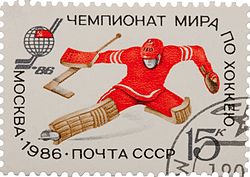 A Soviet stamp dedicated to the 1986 World Ice Hockey Championships | |
| Tournament details | |
|---|---|
| Host country | |
| Venues | 2 (in 1 host city) |
| Dates | 12–28 April |
| Teams | 8 |
| Final positions | |
| Champions | |
| Runners-up | |
| Third place | |
| Fourth place | |
| Tournament statistics | |
| Games played | 40 |
| Goals scored | 296 (7.4 per game) |
| Attendance | 375,820 (9,396 per game) |
| Scoring leader | |
The 1986 Ice Hockey World Championships took place in the Soviet Union from 12 to 28 April. The games were played at the Luzhniki Palace of Sports and the CSKA Ice Palace in Moscow, and eight teams took part. Each team played each other once, and then The four best teams then played each other once more with no results carrying over, and the other four teams played each other again to determine ranking and relegation. This was the 51st World Championships, and also the 62nd ice hockey European Championships. The reigning world champions from Czechoslovakia finished fifth, and the Soviet Union became World Champions for the 20th time, and also won their 24th European Championship. In the European Championship, only mutual games between European teams in the first round were counted. For the disappointing Czechoslovaks, this was the first time since 1967 that they had finished out of the medals, [1] and their worst result outside the Olympics since 1937.
Contents
- World Championship Group A (Soviet Union)
- First round
- Final Round
- Consolation round
- World Championship Group B (Netherlands)
- World Championship Group C (Spain)
- First round 2
- Group 1
- Group 2
- Final Round 2
- Consolation round 2
- Ranking and statistics
- Tournament Awards
- Final standings
- European championships final standings
- Scoring leaders
- Leading goaltenders
- Citations
- References
Attracting little notice at the time, Brett Hull made his debut in international hockey for the United States. It would appear that if Canadian coach Dave King had invited him to play in Moscow, the college student with dual citizenship, would have happily chosen a different path. Instead he chose to accept coach Dave Peterson's offer to compete for the Americans. [1] [2]